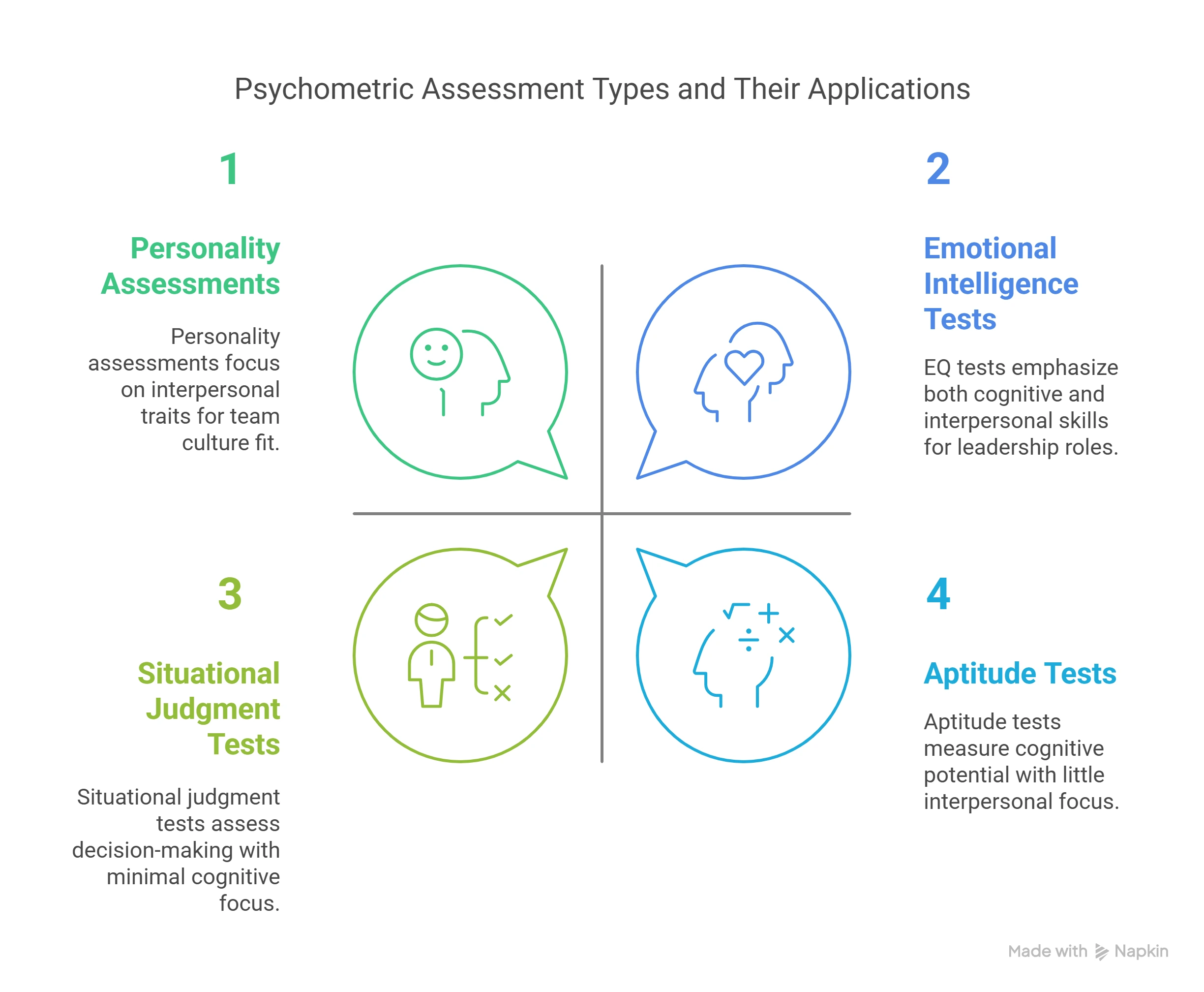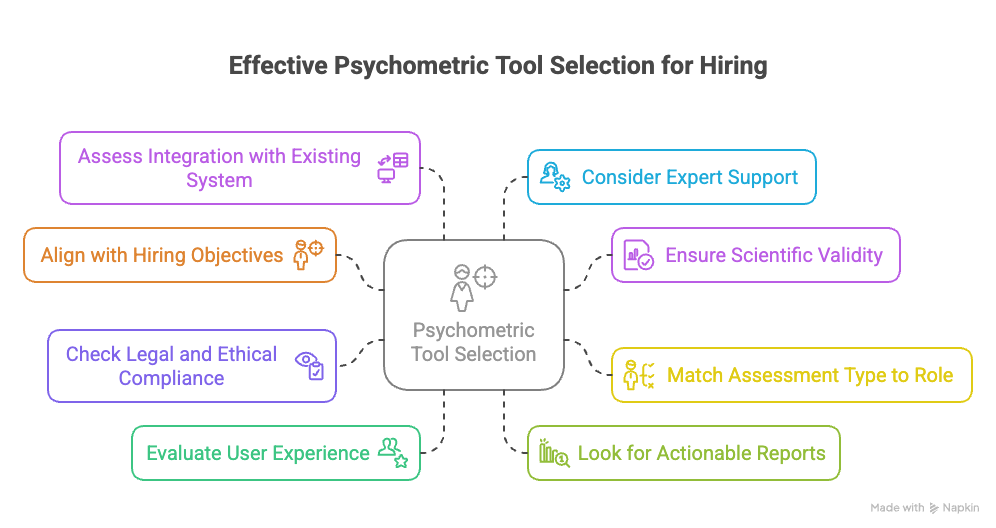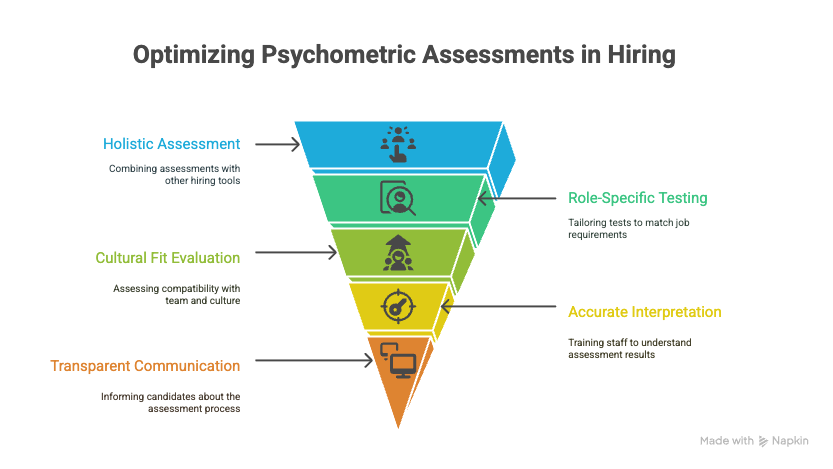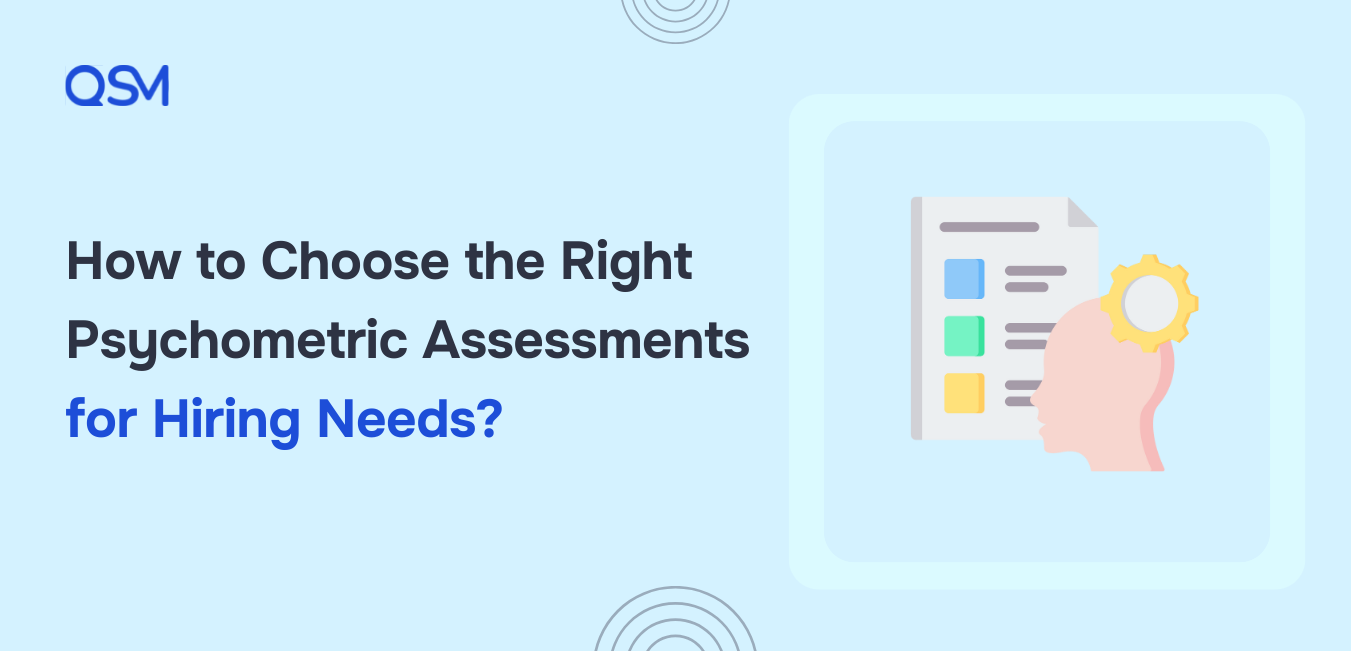Hiring is no longer just a numbers game of experience and qualifications. Today, organizations want to understand who they’re hiring, not just what they’ve done. This is where psychometric assessments for hiring needs become essential.
These tools provide measurable, objective insights into a candidate’s personality, cognitive ability, emotional intelligence, and situational judgment. However, with the rising number of assessment tools available, the real challenge lies in choosing the right one.
An ineffective assessment can mislead hiring decisions, waste resources, and harm your employer brand. In this guide, we break down how to choose the right psychometric assessments for hiring needs.
Table of Contents
Understanding Your Hiring Needs First
Before you start exploring tests and platforms, pause and ask: What are you really hiring for? Is the position highly analytical or people-oriented? Do you need someone who works independently or thrives in collaborative settings?
Understanding the specific competencies, behaviors, and traits required for success in a role helps narrow down which psychometric assessments for hiring will be relevant.
For instance, hiring a senior manager may require a deep dive into leadership style, decision-making, and emotional regulation, something a basic aptitude test won’t reveal. Defining your needs is the foundation for a strategic and effective selection process.
Types of Psychometric Assessment

1. Aptitude and Cognitive Ability Tests
These assessments focus on skills like numerical reasoning, logical thinking, and verbal comprehension. They’re ideal for roles where intellectual agility matters, such as in IT, finance, or operations. When selecting psychometric assessments for hiring needs, aptitude tests are often the go-to option for measuring raw cognitive potential.
2. Personality and Behavioral Assessments
Used to understand traits such as openness, conscientiousness, and extroversion, these assessments can predict how well someone will adapt to your team culture. For companies aiming to strengthen collaboration or reduce turnover, these psychometric assessments for hiring needs are especially powerful.
3. Emotional Intelligence (EQ) Tests
EQ tests evaluate how individuals manage their own emotions and relationships with others. If you’re hiring for leadership roles, HR, or any position requiring empathy and conflict resolution, psychometric assessments must include an EQ component to be effective.
4. Situational Judgment Tests
These assessments present candidates with hypothetical, job-relevant scenarios to see how they’d respond. They offer a practical view of decision-making and ethics, making them a valuable part of assessments, especially in customer service, managerial, or compliance-heavy roles.
How to Choose the Right Assessment Tool

1. Align the Tool with Your Hiring Objectives
Different roles require different strengths. Your hiring objectives should clearly dictate what kind of traits or capabilities you’re trying to assess. If you’re aiming to reduce employee turnover, for instance, you’ll want to measure behavioral fit and alignment with company values. Every psychometric tool should directly support your recruitment goals, not just add another layer of filtering.
2. Ensure Scientific Validity and Reliability
Only use assessments that are backed by scientific research. Validity ensures the test measures what it claims to, and reliability ensures consistent results over time. This reduces legal risk and improves decision-making. Always request validation documentation from assessment providers.
3. Match the Assessment Type to the Role
A one-size-fits-all approach doesn’t work. The assessment for a creative strategist should be very different from one for a logistics coordinator. Choose tools tailored to the specific competencies each role demands.
4. Check for Legal and Ethical Compliance
Ethical hiring isn’t optional. Make sure your assessments comply with local labor laws and avoid potential biases. Look for assessments that meet industry standards and provide equitable access to all candidates.
5. Evaluate User Experience for Candidates
A confusing or time-consuming test can frustrate candidates and harm your employer brand. Opt for tools that are intuitive, mobile-friendly, and respectful of candidates’ time. Good UX increases completion rates and leaves a positive impression.
6. Look for Actionable and Easy-to-Read Reports
Your hiring managers shouldn’t need to be psychologists to interpret results. The reports should be clear, concise, and offer insights that are easy to act on, such as candidate strengths, red flags, and development areas.
7. Assess Integration with Your Existing Hiring System
If you already use an ATS or CRM, look for assessment tools that integrate seamlessly. Integration reduces manual work, speeds up the process, and helps centralize all hiring data for better decision-making.
8. Consider Expert Support and Customization Options
Sometimes off-the-shelf tests don’t cut it. If you’re hiring for niche roles or need detailed analysis, choose a provider that offers customization and access to expert consultants. Tailored support ensures your assessments are aligned with your company’s culture and hiring strategy.
Common Mistakes to Avoid

1. Treating Assessments as the Only Filter
Assessments are one part of a holistic hiring process. Over-relying on them can result in missing out on high-potential candidates who might not test well but have real-world experience and soft skills. Use psychometric assessments for hr to complement, not replace, interviews, portfolios, and references.
2. Using One Generic Test for All Roles
A general test may not capture the nuances of different job roles. For example, a software developer and a marketing strategist have vastly different skill requirements. Use role-specific psychometric assessments for hiring needs to get more meaningful and job-relevant data.
3. Overlooking Cultural Fit and Team Dynamics
Even highly skilled individuals can fail if they don’t mesh well with the team or organizational culture. Use assessments that evaluate interpersonal style, adaptability, and shared values. This ensures that psychometric assessments for hiring needs are also screening for long-term compatibility.
4. Failing to Interpret Results Correctly
The most robust assessment is useless if misinterpreted. Make sure your team is trained in understanding what the scores mean and how to act on them. Misreading results is one of the most common pitfalls when implementing psychometric assessments for hiring needs.
5. Not Informing Candidates About the Process
Candidates deserve to know why and how assessments are used. Provide transparency and context; it builds trust and reinforces your brand’s professionalism. A respectful approach helps candidates view psychometric assessments for hiring needs as a value-add, not a hurdle.
How Can QSM Help in Creating a Psychometric Assessment?
At QSM, we specialize in developing and delivering customized online psychometric assessments for hiring needs. Our tools are rooted in behavioral science and built to meet real-world recruitment challenges. Whether you need off-the-shelf tests or tailored solutions for niche roles, we ensure your assessments are valid, engaging, and compliant.
Beyond the tool, we offer interpretive support, integration capabilities, and ongoing insights to refine your hiring process over time. From startups to large enterprises, QSM helps organizations make smarter, data-backed hiring decisions.
In Conclusion
Choosing the right psychometric assessments for hiring needs isn’t just a technical decision, it’s a strategic one. The right tool can improve your hiring quality, reduce bias, enhance team fit, and boost long-term retention.
But success lies in how well you align the assessment with the role, interpret its findings, and integrate it into your broader hiring strategy. Whether you’re just starting or looking to improve your current process, a thoughtful approach to psychometric assessment for recruitment can transform your recruitment from guesswork into a science-driven, people-first experience.
If you liked reading this blog, also read our detailed guide on How to Create High-Converting Popups in WordPress.




